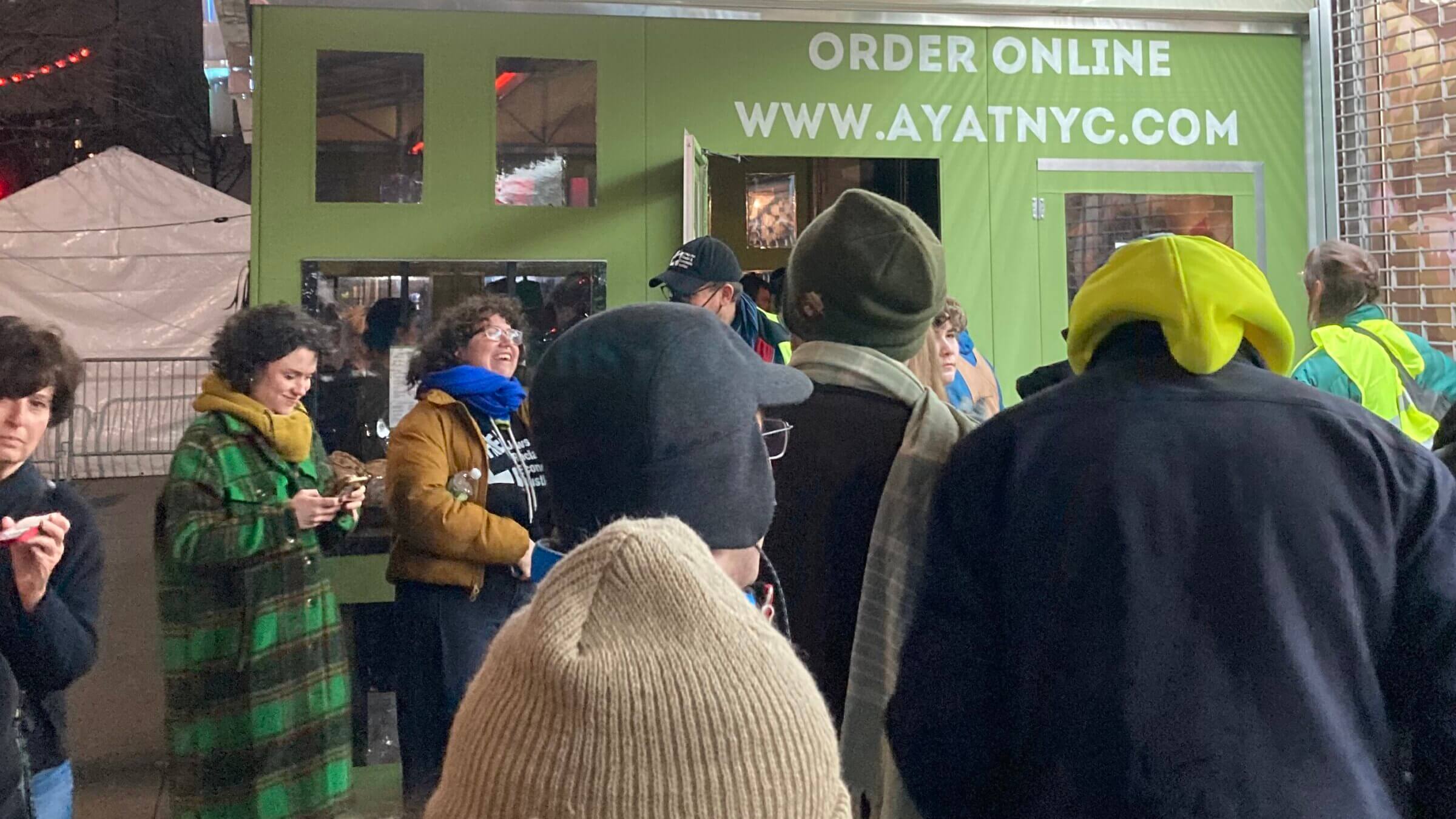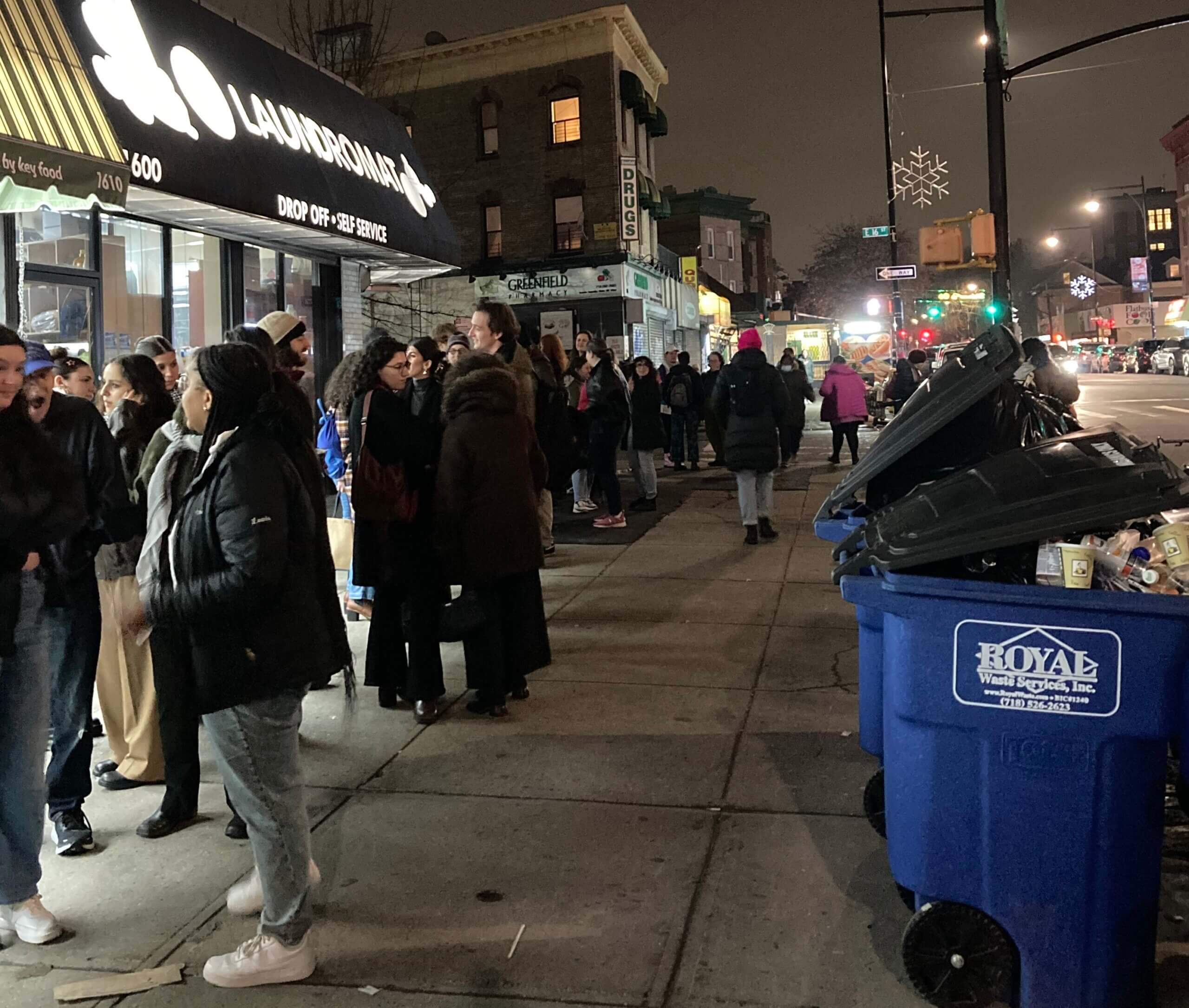A Palestinian restaurant faced a flood of online abuse — so its owners hosted Shabbat for 1,300 guests
At Ayat, a Brooklyn mainstay of Palestinian cuisine, there is such a thing as a free dinner

The owners of the Palestinian restaurant Ayat invited Jewish neighbors to a Shabbat dinner after facing backlash for their anti-Zionist politics. Photo by Irene Katz Connelly
In early January, an unusual post began to circulate on Instagram.
“In the spirit of togetherness and understanding, we invite all our incredible neighbors, especially our Jewish neighbors, to a heartfelt Shabbat dinner,” said the post, created by Abdul Elenani and Ayat Masoud, the outspoken husband-and-wife owners of Ayat, a Palestinian restaurant chain with locations across New York City. “Let’s create a space where differences unite us, where conversations flow freely, and where bonds are forged.”
The invitation was a gamble. Since opening Ayat’s latest branch in December, a few months after Hamas’ Oct. 7 attack on Israel, Elenani and Masoud had faced vitriolic online comments and even death threats for their staunch opposition to Israel’s invasion of Gaza. When I first saw the post, I wondered if the people who had been lambasting Ayat in Facebook groups and on restaurant review platforms would take the chance to show up in person.
Then, as the post racked up thousands of likes, I began to consider how the couple would be able to pull off an event that was quickly ballooning in scale. The Ayat location where the dinner was slated to take place is a modest storefront in the south Brooklyn neighborhood Ditmas Park. How many “incredible neighbors” could the restaurant actually hold?
Such concerns proved to be unfounded last Friday, when a (mostly) orderly crowd of hundreds descended on Ayat to celebrate Shabbat, show Jewish support for the restaurant’s anti-occupation politics, and affirm that — at least in Brooklyn — coexistence between Jews and Muslims is a reality, not a pipe dream.
“I’m hoping people realize that they can just get along together,” said Elenani, presiding over an abundant buffet in an orange windbreaker. “I’m hoping we have enough food, honestly.”

For New Yorkers craving Palestinian food, Ayat is not a new name. Elenani and Masoud started the restaurant, which now boasts six branches, in 2020. Notably, Ayat isn’t even their main gig. Masoud, 33, is a lawyer, while Elenani, 30, also owns a construction business and a chain of coffee shops. (Nor was opening Ayat their first experience generating headlines: In 2019, they gained local notoriety for the unorthodox, but not illegal, decision to stable a pet horse in their Staten Island yard.)
Ayat has always served up activism alongside recipes sourced from Masoud’s Jerusalem-born parents. Murals in several locations show Jerusalem’s Al-Aqsa mosque guarded by Israeli soldiers, while the seafood section of the menu is titled “From the River to the Sea.” The restaurant’s Instagram page alternates between mouth-watering food spreads and pleas for followers to “stand up for Gaza.”
From the restaurant’s inception, its owners faced some criticism for their unapologetic political stance. But after Oct. 7, Ayat received a deluge of one-star ratings on restaurant review platforms. The Ditmas Park location’s opening convulsed the neighborhood Facebook group, with some accusing the restaurant of promoting “genocidal” language while Ayat’s defenders raved about the food. On Ayat’s Instagram page, one user promised to “blow and butcher everything related to you.”
“No Animosity Between People”
The evening began in a sidewalk tent with a Moroccan Shabbat service led by singer Laura Elkeslassy and other members of a collective that leads Sephardic and Mizrahi worship in New York. By the time the service ended, the tent was overflowing. Hundreds of guests in keffiyehs and kippot greeted friends in Hebrew and English as they formed a line that eventually stretched around the block. Many were members of progressive groups like Jews for Racial and Economic Justice (whose yellow-vested members also provided crowd control), Jewish Voice for Peace, and IfNotNow. City government officials including comptroller Brad Lander and progressive council member Shahana Hanif, as well as local Jewish celebrities like Abby Stein, flitted down the line shaking hands.
In a tense political moment when Israel’s military has killed over 25,000 Gazans, over 100 Israelis remain hostages of Hamas, and ceasefire protests have gripped cities across the world, many guests saw the event as a much-needed moment of solidarity. “I kind of teared up when I saw it,” said Jasper, 24, of Ayat’s invitation.
Sally Charnow, 68, a history professor at Hofstra University, said she’d heard about the dinner through her synagogue and thought, “Of course I’m coming!” She was chatting in line with Ora Wise, 42, an Israel-born chef and activist who said that the backlash against Ayat typified wider attitudes towards Palestinian food and culture.
“Whenever Palestinian chefs and restaurants are unapologetically Palestinian, it’s labeled ‘political’ in a way that Israelis or Jewish Americans are not,” Wise said.
As the line inched slowly towards Ayat’s door, guests who had already eaten emerged with chunks of challah, sourced from Gordo’s Heimishe Bakery in Crown Heights, for those still waiting. Employees of the supermarket next to Ayat surveyed the scene as the klezmer clarinetist Michael Winograd gave an impromptu concert on the sidewalk. A passerby struggling to make his way through the crowd shouted, “Alright, now do some Mexican music!”
By the time I reached Ayat’s door, the JFREJ volunteer serving as bouncer had clocked 279 people entering the restaurant. (Elenani later said that 1,300 people attended.) Inside, guests moved slowly along a buffet of hummus, baba ghanoush, chicken, and mansaf, a Levantine dish of lamb cooked in fermented yogurt. A half-demolished poppy seed challah stretched the length of an entire table, and strangers introduced themselves around crowded tables.
Haris Khan, a Muslim community organizer who lives in South Brooklyn, said he hoped the dinner would show that Palestinian opposition to Israel’s actions is not motivated by antisemitism. “I hope events like this continue to show that there’s no animosity between people,” he said. “There’s just human rights violations we all have to stand against.”
As empty plates began to pile up, Elkeslassy led a song circle inspired by Syrian traditions. Three hours after Ayat had opened its doors, the singing was going strong, and latecomers were still filling up plates while Elenani and Masoud, looking exhausted, caught their breath on plastic chairs.
Ellen Lippmann, a rabbi and Ditmas Park resident, hoped the dinner would cause Ayat’s critics to reevaluate their hostility toward the restaurant. “I hope they would learn that it’s possible for people to stand on the sidewalk together,” she said. “It’s possible that Palestinians, who could have a great deal of anger about Jews, are instead offering Shabbat dinner.”
Whether that might actually happen remains to be seen. The attendees I spoke to were already supportive of Ayat’s politics — in other words, Elenani and Masoud hadn’t exactly won over the haters. But, asked if he thought the dinner might stem the online abuse, Elenani said it didn’t matter.
“As long as we’re doing something positive in the world, that’s all I care about,” he said. “Whatever comes out of that is not up to me.”

















